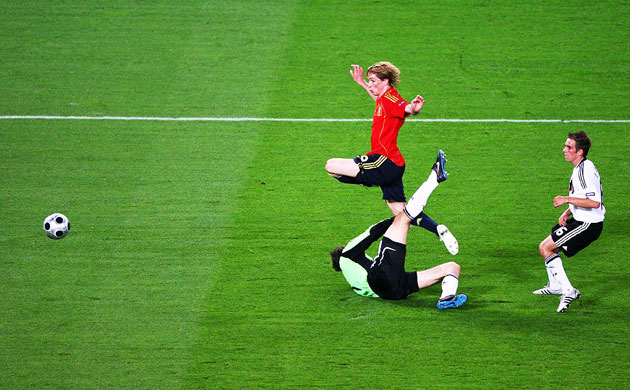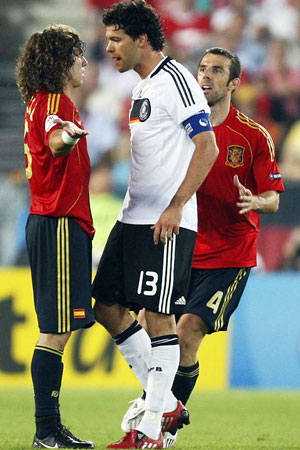It appears that a few preseason magazines have the Florida Gators at No. 1 for the upcoming season. What do you think?
-- Ryan, Orlando
As I've said in the past, different people have different interpretations of what a preseason poll should be. I'm one of those who treat them as a "starting point," based on how a team finished the year before and who it has coming back. Most people, however, treat them as a prediction of what the final poll will be next January -- and obviously preview magazines fall into that category.
To that end, predicting Florida to win this year's national championship is as reasonable a prediction as any. The Gators return 16 starters, including a Heisman-winning quarterback (Tim Tebow), an otherworldly playmaker (Percy Harvin), a solid offensive line and nearly every key defensive player. And if you're one of those that likes to "play out" the schedule, you have to like the fact Florida plays just one road game against a team likely to be ranked in the preseason (Tennessee).
But let's not forget, the Gators lost four games last season and finished last in the SEC in pass defense. Anyone who's projecting Urban Meyer's team as national champion is making three pretty bold assumptions:
1) That Florida's defense will improve considerably. The Gators were extremely young on that side of the ball last year, starting as many as 10 freshmen and sophomores, and it showed. With a year's experience under their belt, it's not unreasonable to expect former all-everything recruits like linemen Carlos Dunlap, Justin Trattou and Torrey Davis or safety Major Wright to explode, but will it be enough for the unit to leap from mediocre to dominant?
2) That Tebow will hold up physically for another entire year. Which goes hand in hand with No. 3.
3) That a legitimate tailback will finally emerge. This is not just important in terms of taking some of the rushing load off Tebow but also because Florida's offense, for all its purported weapons, was very predictable at times last season. In the Capital One Bowl loss to Michigan, Tebow and Harvin accounted for 29 of 32 rushing attempts. The Gators need Chris Rainey or Emmanuel Moody to become a threat for Meyer's spread offense to be consistently dangerous.
I'll give Mandel point one, but to me, that's where the Florida analysis starts and ends. LSU survived an injury to its starting quarterback last year. Florida has two blue chippers sitting behind Tebow, both of whom have a year in Florida's system. If Urban Meyer could turn Alex Smith into the worst first draft pick in NFL history, then I think he can survive a game or two with Cameron Newton or John Brantley. Obviously, if Tebow is out for an extended period of time, then the Gators are in big trouble, but that's true for just about every major contender, save for Ohio State and their annoying, quarterback-optional approach to winning.
As for the third point, Florida averaged 457 yards and 42.5 points per game last year and gained a healthy 5.3 yards per carry against a very difficult schedule. If the Gators managed all of that without a functioning tailback, why exactly it is a necessity for Florida to find a tailback this year? Sure, it would be nice, but a top tailback in Florida's offense means fewer carries for Tebow and Harvin. Is that really a good thing? It's surely not a requirement that Florida hand the ball off 20 times.
But wait, it gets better...
Preseason magazines are mostly for fun (and for trying to decode Steele's elaborate color scheme), so there's no point getting too worked up over these rankings. If you're a Georgia fan, however, I'd imagine you're going to be pretty steamed if the AP and coaches polls follow suit. The Dawgs finished ahead of the Gators in the SEC standings last season, beat them on the field and return more starters (17).
Right, because that one extra starter that Georgia is returning really matters. There are perfectly convincing arguments to be made that Florida can be ranked ahead of Georgia. Georgia was a fumble by Vandy away from spiralling last year. The Gators' expected improvement on defense is greater than Georgia's expected improvement in any area. Florida has owned Georgia over the years, so one win shouldn't rationally convince Georgia fans that they have an advantage over Florida in Jacksonville.
We all know that preseason starting position can have a direct impact on the final results. For instance, while I thought LSU was plenty deserving of both its preseason and end-of-regular-season No. 2 rankings, there's no doubt in my mind that had the roles been reversed and Oklahoma had started the year No. 2 instead of No. 8, and LSU vice versa, the 11-2 Sooners would have played in the BCS title game instead of the 11-2 Tigers.
WTF? LSU had the same record as Oklahoma and played a demonstrably more difficult schedule. That would have been true regardless of where the two teams started the year. Mandel really might consider reading his own archives, because he's argued in the past that voters are improving and are really analyzing teams based on their merits instead of taking the conveyor belt approach when it comes to deciding who players for the national title. This, after all, was his reasoning for supporting Florida's jump over Michigan in 2006 when the Wolverines were higher ranked going into the final weekend. If voters can flip teams based in one week, how does Mandel argue with a straight face that they'll remember who they ranked in August and defer to that judgment?
Fast forward to this year. Let's say, hypothetically, the preseason AP poll replicates Steele's, which has Florida No. 1 and Georgia No. 9. And let's say, hypothetically, that it's another year like last season where a cluster of teams all finish with one or two losses. If Florida winds up one of those teams, it will have a much better chance of finishing in the top two than Georgia would if placed in the same scenario, and that's an advantage the Gators have not yet earned.
Or, the voters might just vote for the team that won the neutral site game between Florida and Georgia. Seriously, Mandel, of all the teams to use when you make this argument, you pick two teams who play each other in a split stadium every year. With the exception of Texas and Oklahoma, you picked the two worst teams to illustrate your point. If Florida and Georgia finish with the same record, 99 times out of 100, the team that wins the game will finish higher if the voters are paying attention.
I was somewhat astonished and dismayed at NBC's renewal of its TV contract with Notre Dame. This is not because I don't want to watch Notre Dame, but rather that it seems to be a slap in the face of the parity that the NCAA seems to be trying for. The reasoning being that all else being equal between two schools, isn't the fact that a recruit would be guaranteed to be on national TV for every home game an artificially introduced advantage toward Notre Dame? How is this fundamentally any different than if Notre Dame was able to pay recruits?
-- Darren Beyer, Orlando, Fla.
The difference is, the NCAA has rules against paying recruits, and can penalize its institutions accordingly. It does not have the authority, however, to tell NBC what it can or cannot put on its airwaves. In fact, it would be breaking the law if it did.
Notre Dame's right to sign a contract with NBC -- just like the Big Ten's right to sign with ABC, the SEC's right to sign with CBS, etc. -- was established by the United States Supreme Court in 1984. Prior to that, the NCAA strictly regulated how many times a school could appear on TV and how much it could be compensated for those appearances. Georgia and Oklahoma sued the NCAA on the grounds that those policies violated anti-trust law, and ultimately, the highest court in the land agreed. As a result, technically, all schools are free to negotiate their own network TV deals; it's just that all but Notre Dame, Army and Navy choose to do so within the confines of a conference.
So while the Irish's perceived recruiting advantage may in fact exist, it would be incorrect to describe it as "artificially induced." It actually came about through the most natural means possible: Capitalism.
First of all, this is an idiotic question. Mandel managed to print a question from possibly the only person who is surprised that teams like Notre Dame can turn their popularity into exposure. Second, I have to imagine that the Milton Friedman disciples among us cringed at that answer. Notre Dame has the right to strike its own TV deal because of antitrust law (and the Supreme Court's interpretation thereof). The Sherman Act is not "capitalism." To liberals/moderates like me, it is a reasonable regulation on the free market. To true libertarians, it is an unreasonable encroachment on the free market. But it's not the free market itself!
That felt good.




